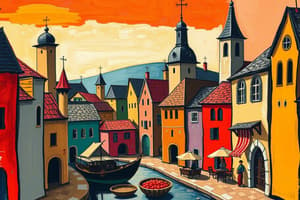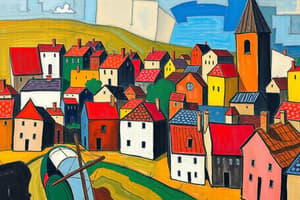Podcast
Questions and Answers
How did the rise of towns contribute to the decline of the feudal system in medieval Europe?
How did the rise of towns contribute to the decline of the feudal system in medieval Europe?
- By limiting social mobility and economic opportunities for serfs.
- By providing an alternative social structure based on wealth rather than birth, attracting people away from manors. (correct)
- By increasing the economic dependence of townspeople on feudal lords through higher taxes.
- By reinforcing the importance of birthright over wealth.
What was the primary advantage gained by merchants who obtained a charter from feudal lords?
What was the primary advantage gained by merchants who obtained a charter from feudal lords?
- Exemption from all forms of taxation, fostering rapid economic growth.
- Guaranteed hereditary titles and noble status within the feudal hierarchy.
- A degree of self-governance, including the right to elect mayors and establish courts. (correct)
- Exclusive rights to all trade routes, ensuring a monopoly over commerce.
Which factor primarily determined the social status of townspeople in the late medieval period?
Which factor primarily determined the social status of townspeople in the late medieval period?
- Wealth and economic standing. (correct)
- Loyalty to the feudal lord.
- The number of children a family had.
- The family's ancestral lineage and birthright.
What is the lasting significance of the medieval craftsmen and merchants' influence in towns?
What is the lasting significance of the medieval craftsmen and merchants' influence in towns?
How did the revival of old towns and the development of new towns impact European society?
How did the revival of old towns and the development of new towns impact European society?
Flashcards
Late Medieval Towns: Origins
Late Medieval Towns: Origins
Craftsmen and merchants began to live outside manors, offering services and trading.
Town Charters
Town Charters
Towns gained some self-governance, like electing mayors and establishing courts, by paying lords for a charter.
Town Social Status
Town Social Status
Wealth, rather than birth, largely determined social standing in towns.
Towns: Impact
Towns: Impact
Signup and view all the flashcards
Merchant Influence
Merchant Influence
Signup and view all the flashcards
Study Notes
- During the late medieval period, craftsmen and merchants began residing outside of manors, offering services, and engaging in trade.
- This led to the revival of old towns and emergence of new ones.
- Towns were under the ownership of feudal lords, and townspeople were required to pay taxes.
- Social status in towns was primarily determined by wealth, rather than birth.
- Some merchants secured charters from lords in exchange for payment, granting them autonomy, including the right to elect mayors and establish courts.
- Life in towns liberated Europeans from the feudal system.
- Increasing numbers of Europeans were drawn to urban living.
- The medieval period marked a significant phase in European urbanization.
- Medieval craftsmen and merchants wielded greater influence in towns, eventually achieving a dominant position, a characteristic that persists in cities today.
Studying That Suits You
Use AI to generate personalized quizzes and flashcards to suit your learning preferences.




